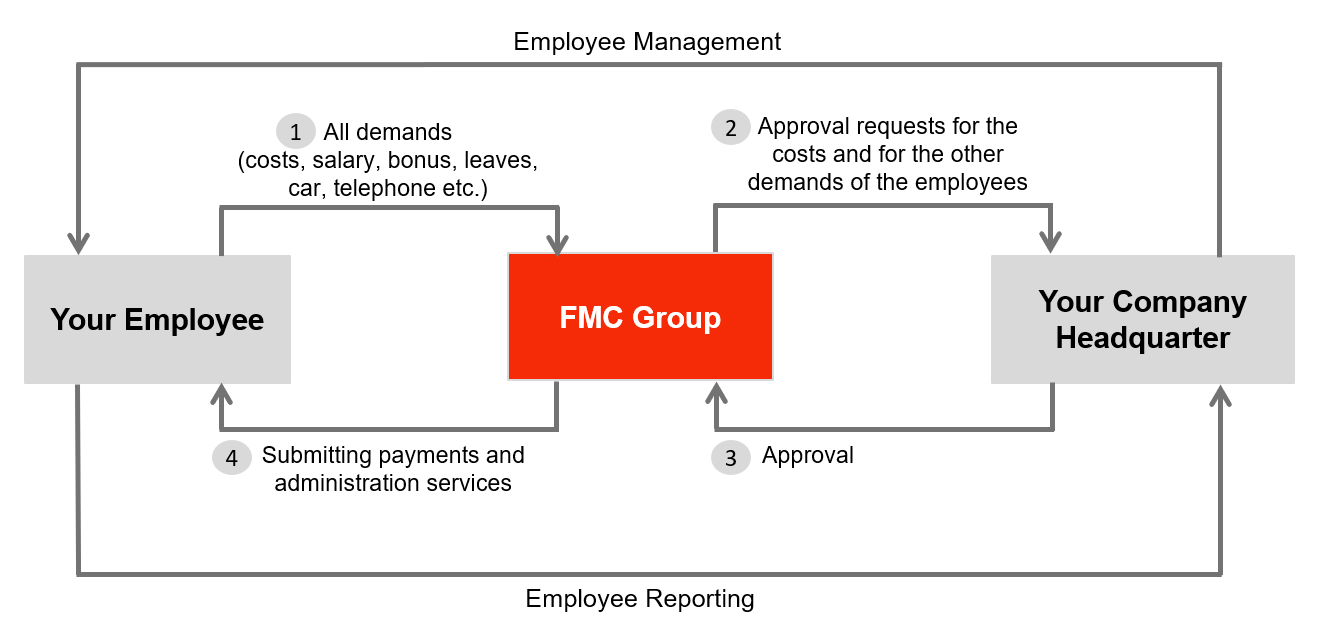
Employer of Record Sweden
Our Employer of Record in Sweden service enables clients to hire employees without the need to operate a local legal entity there.
It makes a big difference to develop a new market with your own personnel on the ground. Particularly for functions related to sales & marketing, business development, distributor management, and service & maintenance, our customers are very satisfied using our Sweden Employer of Record Service.
Our customers and their local teams can be free of the distractions of administrative tasks and complex local requirements. So you can fully focus on the development of your core business.
If your local business grows large enough, you can easily transfer the employees to your own subsidiary. It also provides a quick exit strategy if necessary. In addition to Sweden, we offer Employer of Record services in several other countries.
Content:
- Employer of Record Sweden – FMC Group’s Approach
- Hiring an Employee
- Income Tax
- Typical Benefits
- Time off Policies
- Terminating an Employee

Get in touch with us

Employer of Record Sweden - FMC Group's Approach
- Quick, flexible, and easy entry into Sweden in compliance with local employment laws
- Complete control over business development with your own team
- Good option for building up, managing, and supporting your distributors and key accounts by directly observing local developments and adjusting the strategy whenever necessary
- Using our comprehensive recruitment experience for international clients, we can form a local team that fits your corporate culture.
- Focusing on your core business instead of dealing with the time-consuming and complex local administrative tasks
- Allowing for easy market exit if necessary
- Integrating your employees into our team through motivational events and special meetings
EOR Sweden Management & Reporting Flow

Hiring an Employee
Sweden places a strong emphasis on safeguarding the rights and well-being of its employees through its employment laws, which provide a wide range of social safeguards and benefits. The nation is renowned for its comprehensive welfare system, adaptable work schedules, and stringent standards for achieving a healthy work-life balance.
Employment Contract – indefinite vs. fixed term
An employer has the option to hire an employee on a fixed-term contract without the need for specific justifications, commonly known as “general” fixed-term employment. Fixed-term contracts can also be utilized to cover for temporarily absent employees or to fulfill seasonal work requirements. Additionally, probationary employment is established through a unique type of fixed-term contract.
It’s important to note that both general fixed-term employment and temporary-replacement fixed-term employment automatically transition into indefinite-term contracts if the employee has worked under these conditions for a cumulative period exceeding two years within any five-year timeframe.
Probation Period
In Sweden, probationary periods are usually set at six months and are explicitly mentioned in the employment contract. During this probationary period, employers have the authority to terminate the employment without the need for a specific reason, but they are obligated to adhere to due process requirements.
Once the probationary period concludes, the employer is required to furnish a valid reason for termination, and the employee retains the right to contest this decision.
Work Week, Overtime & Maximum Working Hours
The standard workweek in Sweden typically consists of 40 hours. However, the legal maximum limit for a working week is 48 hours. Once an employee works beyond this limit, they are entitled to receive overtime compensation.
The maximum allowable annual overtime hours are capped at 200. Overtime pay is typically calculated at a rate ranging from 1.5 to 2 times the regular hourly wage.
Income Tax
| Taxable INCOME | TAX RATE (%) |
| Up to 523,200 | 0% |
| above 523,300 | 20% |
For non-resident employees in Sweden, a flat 20% tax rate is applied to their income.
Typical Benefits
Health Insurance Benefits: Sweden offers its residents reliable access to universal healthcare services, primarily managed at the provincial and national levels. While private health insurance is available, it is only utilized by a small percentage of the Swedish population.
Supplementary Benefits: Some companies in Sweden provide additional benefits such as meal vouchers, company cars, stock incentive plans, and extra vacation time to their employees. Employer and employee private pension schemes are also highly popular in the country. For non-European Union (EU) citizens working in Sweden, private pension insurance is generally a mandatory requirement for obtaining a Swedish work permit. Although not obligatory for employers to provide additional pension contributions, it has become a commonly preferred supplementary benefit. It is customary to offer private pension options to employees after they have successfully completed their probation period, typically amounting to 5-10% of their gross monthly salary.
Time off Policies
Public Holidays
In Sweden, employees typically enjoy 13 public holidays each year.
- New Year’s Day
- Epiphany
- Good Friday
- Easter Monday
- Labor Day/May Day
- Ascension Day
- National Day of Sweden
- Midsummer’s Eve
- Midsummer
- November All Saints Day
- Christmas Eve
- Christmas Day
- Boxing Day
Annual Leave
In Sweden, employees have a right to a minimum of 25 days of paid vacation each year. Many employers provide even more vacation days, and employees can request additional days off if needed. Typically, vacation days are accrued one year in advance, so there’s no legal requirement for employers to grant vacation leave during the first year of employment. However, many employers still offer vacation time to new hires.
Employees can carry over up to 5 unused vacation days each year for a maximum of 5 years. They also have the option to receive payment for any unused vacation days. However, regardless of how vacation rollovers and payouts are structured, the employer must always ensure that the employee has the opportunity to take a minimum of 25 days of vacation each year. Additionally, in addition to their regular wages, employees are entitled to a daily vacation premium equal to 0.43% of their monthly salary.
Sick Leave
In Sweden, when employees fall sick, they do not receive any pay for the first day of illness. For the subsequent two weeks, their employer provides sick pay at a rate of 80% of their regular salary. On the 15th day of illness, it becomes necessary to report the illness to Försäkringskassan, the Swedish Social Insurance Office, which then takes over the responsibility for providing sick pay.
It’s important to note that only individuals with a Swedish personal identification number (personnummer) have the right to receive governmental sick pay. If an employee’s illness persists for more than 7 days, they are required to provide a doctor’s certificate as documentation for their sick leave.
Other Leave Types
In Sweden, employees have access to a generous parental leave allowance of up to 16 months, which amounts to 480 days in total. Mothers are entitled to at least seven weeks of leave before and after giving birth. Additionally, the partner of the mother can take ten days of leave for the birth. The 480-day parental leave can be shared between either parent, but 60 days of it are specifically reserved for each parent.
Regarding remuneration, it is not mandatory for employers to cover parental leave payments, although many choose to do so. Parents can usually access government-funded support amounting to 80% of their normal salary while on parental leave. However, this support is limited depending on the type of leave being taken and is reduced to a significantly lower payment after 390 days of leave have been utilized.
Terminating an Employee
In Sweden, when either the employee or the employer wishes to terminate the employment contract, written notice must be provided to the other party. The specific notice period is determined based on the contractual obligations outlined in the employment agreement. However, some general rules apply:
- For employment periods of less than 2 years, a 1-month notice period is required.
- For employment durations ranging from 2 to 4 years, a 2-month notice period is necessary.
- An additional 1-month notice is added for every 2 years of employment, up to a maximum of 6 months.
Disclaimer: Although we carefully researched and compiled the above information, we do not give any guarantee with respect to the actuality, correctness, and completeness.
